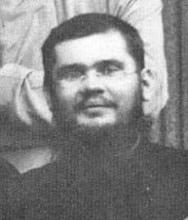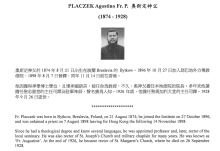Father Augustin Placzek first came to Hong Kong in 1898 at the age of 24. Although born in Poland, he completed his studies in Italy where he joined the Milan Foreign Mission Society. On arrival in Hong Kong he was given charge of the Italian Mission Seminary as Professor. Soon afterwards he was appointed Chaplain to the Forces. He was Rector and Military Chaplain at St Joseph's Church from 1904 to 1925. Known for his forceful preaching, he was responsible for bringing St Patrick's Club into being as a meeting place and recreation hall not only for his St Joseph's congregation, but especially servicemen and other residents, irrespective of their beliefs. He finally took over rectorship of the new St. Margaret Mary's Church in Broadwood Road in 1927. Due to his efforts the church had one of the finest organs in the Colony, beautiful stained glass windows and an electric clock.
On a personal note, Fr. Placzek was probably responsible for the conversion of my grandfather, Charles Warren, to the Catholic faith in about 1900 and for my grandfather's close relationship with the Catholic Church in Hong Kong and with the missions on the China coast. He gave a moving address at his funeral on 9th June 1923. He also baptised my uncle Leslie Warren and my aunt Evelyn Warren, if not my father.
Fr. Placzek died at the French Hospital, Causeway Bay after an illness of only a week. His funeral cortege, attended by about 1,000 mourners, was reported in the China Mail and the Hong Kong Telegraph of 28 September 1928.



Comments
Father Agostino Placzek
Here is the young Father Placzek, when he was 27. The photo was taken around 1901.
Another photo of Fr Agostino Placzek taken in 1925.
Extract from an Article in 1928
"......Father Augustin’s broadmindedness prompted him to welcome everybody at St. Patrick’s irrespective of their religious beliefs, so that he rapidly became well-known and popular with every foreign residents in Hong Kong. There are still many old residents, non-Catholics, who hold Father Augustin in deep regard, a regard which he fully earned and which he held to the last. These old friends will doubtless regard Father Augustin’s passing as a personal loss.
Of a kindly and genial disposition, Father Augustin always had a good word of advice to every stranger in Hong Kong. He went out of his way to make them feel at home, helped them to carve out a career, and, to really deserving cases, helped them financially as far as he could. Many have to thank Father Augustin for a start in life in the old days, and many were deeply grateful to the good priest for his assistance, Father Augustin’s reward lay in the fact that his proteges remained ever grateful and loyal to him. Although he had always been a frank, plainspoken man, it was difficult for anyone to take offence, so pleasingly were the “little lectures” delivered for the good of those he took upon himself to uplift......."
Location of St. Patrick's Club?
Perhaps someone knows the location of the former St. Patrick's Club mentioned above. Was it an extension of St. Joseph's Church?
I here quote another excerpt from the 1928 memorial eulogy of the Catholic Church in Hong Kong to Father Agostino Placzek (1874-1928) published in the following link:
https://archives.catholic.org.hk/In%20Memoriam/Clergy-Brother/A-Placzek.htm
“Of great organizing ability, Father Augustin saw the need of a meeting place and recreation hall for his flock at St. Joseph’s and it was due to his efforts that St. Patrick’s Club was brought into being. Club life in Hong Kong 25 years ago did not afford the facilities to be found at the present time, so that St. Patrick’s Club was a boon to every man, especially Servicemen. Father Augustin’s broadmindedness prompted him to welcome everybody at St. Patrick’s irrespective of their religious belief, so that he rapidly became well-known and popular with every foreign resident in Hong Kong. (…)"'s
The following extract about Father Placzek's "banishment" at the beginning of WW1 seems not to be corroborated by newspaper articles reporting his presence in Hong Kong during the years of the war.